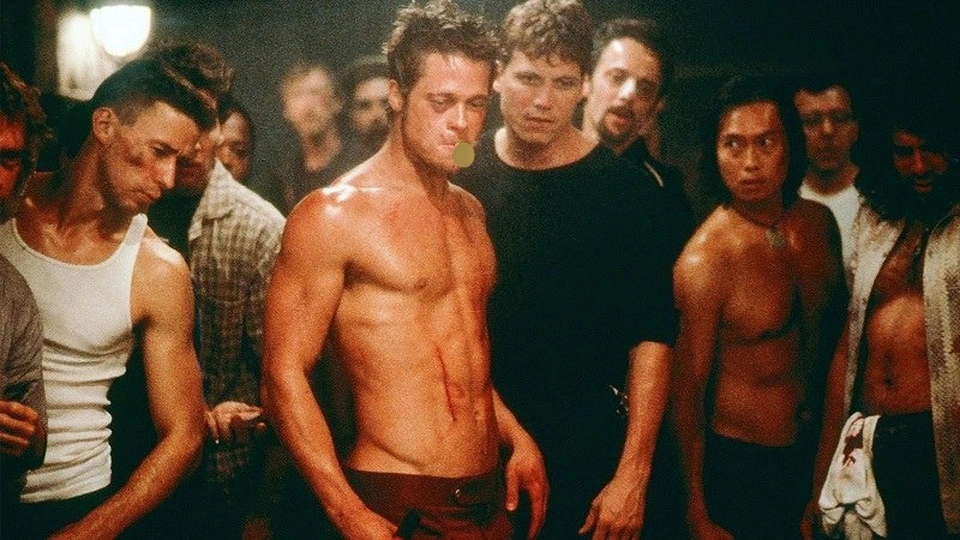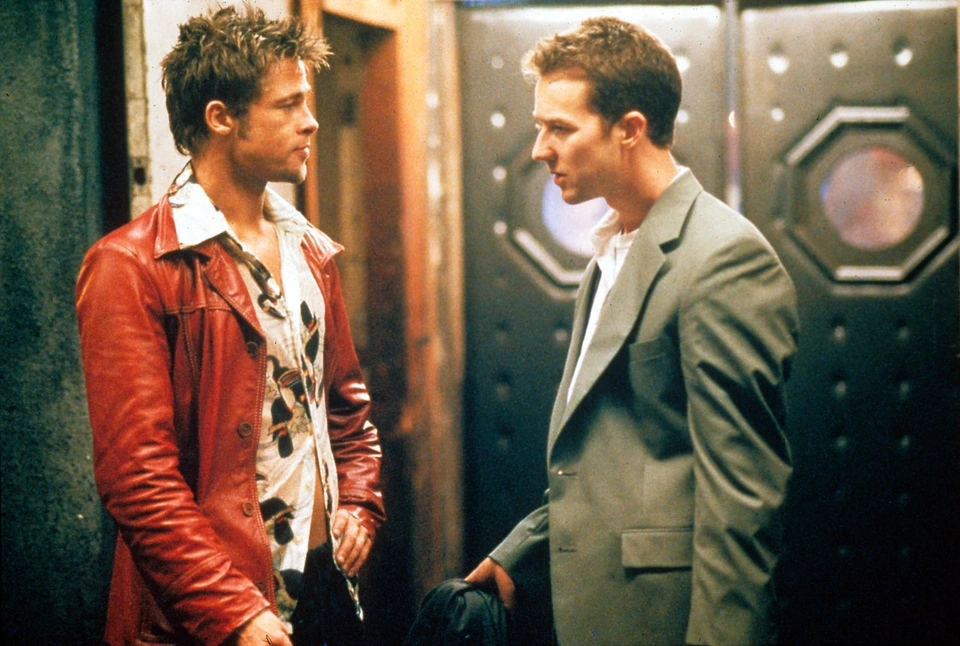🎬 Fight Club (1999): A Raw Journey Through Rebellion and Identity

David Fincher’s Fight Club isn’t just a film—it’s a psychological journey into the gritty underbelly of modern masculinity, identity, and rebellion. Based on Chuck Palahniuk’s novel, the movie delivers a striking portrayal of the psyche of a generation disillusioned by consumerism and conformity.
Plot Overview
The film follows an unnamed, insomniac protagonist (Edward Norton) who feels trapped in the monotonous grind of his corporate job and empty life. His world changes when he meets Tyler Durden (Brad Pitt), a charismatic, anarchistic soap maker who introduces him to the raw, violent, and strangely liberating world of Fight Club. Together, they form a secret underground society where men, stripped of societal expectations, grapple with their primal selves through brutal physical combat.
As the club grows, Tyler’s vision becomes more radical, spiraling into Project Mayhem—a plan to bring society to its knees by challenging its capitalist foundations. But as the protagonist delves deeper, he uncovers disturbing truths that force him to confront who he really is and what freedom truly means.
Themes and Highlights
- Identity and Self-Destruction: The movie grapples with the concept of identity, showing how people often lose themselves in societal expectations. Through the protagonist, we see the inner struggle between societal roles and the yearning for authenticity.
- Consumerism and Rebellion: Fight Club examines the trappings of consumer culture, critiquing the emptiness that often comes with material pursuits. Tyler Durden’s disdain for possessions embodies a stark rejection of this, creating a worldview that’s as destructive as it is liberating.
- The Duality of Human Nature: Tyler Durden represents both the protagonist’s rebellion and his darker impulses, serving as a stark reminder of the internal conflict between civility and chaos.
Iconic Characters

- The Narrator (Edward Norton): Norton’s portrayal of a man trapped in a cycle of frustration and despair is raw and compelling, showing the internal conflict of someone who questions his place in the world and wrestles with his discontent.
- Tyler Durden (Brad Pitt): Brad Pitt shines as Tyler, embodying the spirit of raw charisma and rebellion. Tyler’s philosophies are hypnotic and dangerously compelling, providing a voice to the protagonist’s buried rage and hidden desires.
- Marla Singer (Helena Bonham Carter): Marla, with her dark humor and carefree chaos, is the catalyst for the narrator’s unraveling. Her presence serves as both a mirror and foil, challenging his comfort zones and ultimately his grip on reality.
Visual Style and Direction
Fincher’s direction amplifies the grittiness of the story with a dark, atmospheric aesthetic. The chaotic cinematography mirrors the film’s thematic chaos, with rapid cuts, haunting visuals, and innovative techniques that immerse viewers in the narrator’s fractured psyche. The raw fight scenes—filmed with an unflinching eye—depict violence not as a spectacle but as a brutal act of reclamation for the characters involved.
Soundtrack and Cultural Impact
With a soundtrack by the Dust Brothers, including the iconic end credit song “Where Is My Mind?” by Pixies, the music underscores the film’s anarchic energy. Fight Club became an immediate cultural touchstone, sparking discussions on identity, masculinity, and societal rebellion. Though initially divisive, its cultural significance has only grown, resonating as an anthem for those questioning conventional paths and consumer-driven life.
Why It’s Worth Watching

Fight Club is not only a movie—it’s a visceral experience, a challenge to societal norms, and an invitation to examine our own identities. Through its dark humor, intense action, and profound themes, it explores the human psyche’s shadowy corridors, compelling viewers to question what freedom, rebellion, and authenticity mean in a modern world obsessed with material success.
Perfect For Fans Of:
- American Psycho – For its dark satire on identity and capitalism.
- Requiem for a Dream – For its unflinching dive into human psyche and self-destruction.
- Taxi Driver – For its exploration of alienation and inner conflict.
Fight Club remains an unforgettable cinematic experience—a modern classic that still resonates with anyone daring to question society’s mold. Just remember: the first rule of Fight Club is you do not talk about Fight Club.











